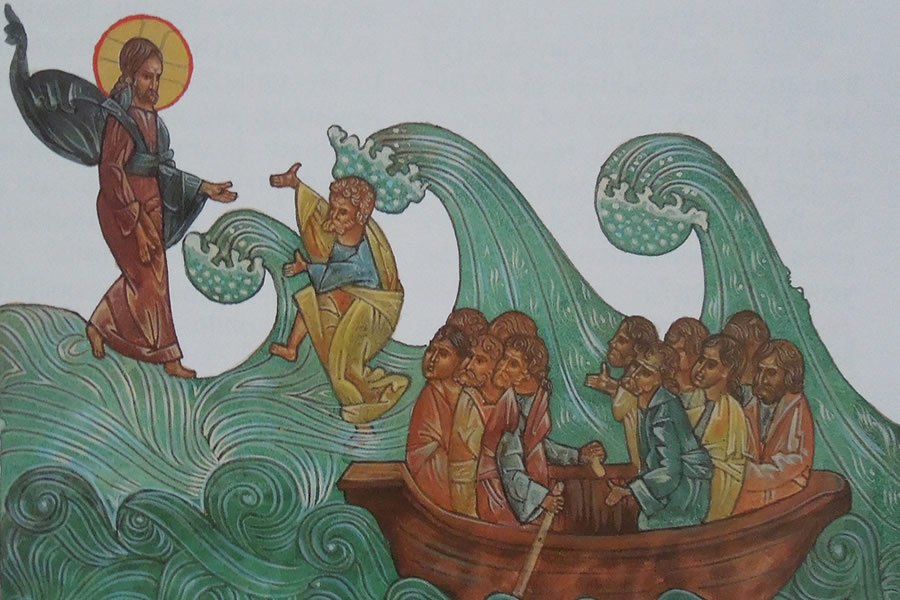St. Francis of Assisi Weekly Reflections

Upon this ROCK I will build my church...
08-27-2017Weekly ReflectionWe Celebrate Worship Resource, Vol. 42, No. 2A key can be very important. Two of today’s readings feature keys as a symbol of authority that grants access. In Isaiah, the prophet is sent to announce that God is taking they keys away from Shebna, the king’s prime minister of the palace, and giving them to Eliakim, to grant the people access and to meet their needs. The image of the keys also appears in our Gospel. Jesus asks what the people are saying about him, and then, what the apostles themselves think about him. Simon’s answer, “You are the Christ, the Son of the living God,” is rewarded (Matthew 16:16). Jesus recognizes that the Father is at work in Simon, and gives him a new name, “Peter,” meaning rock. Jesus then declares, “Upon this rock I will build my church...I will give you the keys to the kingdom of heaven” (16:18, 19). With this, Peter becomes the head of the apostles, but his education in holding the keys will continue. What explains God’s choice? Saint Paul reminds us how inscrutable are God’s judgments and how unsearchable God’s ways. God often chooses to work through weak human beings for the good of others.
Through what unexpected person has God worked for your benefit?
READ MORERepresentatives of Christ
08-27-2017Question of the Week- Reading I: Isaiah 22:15, 19-23 (Eliakim chosen by God)
- Reading II: Romans 11:33-36 (praise of God)
- Gospel: Matthew 16:13-20 (Peter the rock)
- Key Passage: He said to them, "But who do you say that I am?" Simon Peter answered, "You are the Messiah, the Son of the living God." (Matthew 16:15–16)
- Adult: If you were asked, how would you explain Jesus to a person who had not heard of him?
- Child: Who do you tell people Jesus is?
The Book of the Gospels
08-27-2017Liturgy CornerFr. Paul Turner © 2001 Resource Publications, Inc.The book of the Gospels is a collection of Gospel passages proclaimed at Mass. It is an excerpt of the lectionary, usually containing the Gospels for Sundays and solemnities, and decorated with dignity. It does not contain the entire text of all four Gospels. The words of Jesus are highly esteemed by Christians, so the Book of the Gospels receives more respect than other volumes of the lectionary.
It is not required to use the Book of the Gospels at Mass, but it is recommended. This book – not the lectionary – may be carried in the entrance procession by a deacon, or by a lector when there is no deacon. The minister walks with the book slightly elevated and places it on the altar, which represents Christ, the living stone (1 Pt 2:4). This placement unifies two primary symbols for Christ: the Liturgy of the Word and the Liturgy of the Eucharist.
READ MORELiturgy of the Word
08-20-2017Liturgy CornerBruce CroteauThe Liturgy of the Word begins immediately following the Collect prayer at the end of the Introductory Rites. It is comprised of: First Reading, Responsorial Psalm, Second Reading, Gospel, Homily, Profession of Faith, and the Universal Prayer (Prayer of the Faithful). Proclamation of the Word of God is a dialogue with God. We hear the words of salvation history both from the Old and New Testament—words that tell the story of God’s participation in His own creation—words that have established the covenant relationship between God and His people.
READ MORE
FAITH is what unites the heart of the people with the heart of God
08-20-2017Weekly ReflectionWe Celebrate Worship Resource, Vol. 42, No. 2Inclusion is God’s plan. God’s desire is that all God’s children enter into community with each other and with God. Today’s three readings invite us to reflect on a biblical vision of the relations between Christians and Jews and to extend that to all God’s children. The final section of the book of Isaiah envisions God bringing “foreigners” who have “join[ed] themselves to the Lord” to God’s holy mountain, where their prayer and offerings will be acceptable to God and God’s house shall be called “a house of prayer for all peoples” (56:6,7), Saint Paul emphasized that God called Israel to be a light to the nations, drawing them from disobedience through God’s mercy revealed in Christ; God will not abandon Israel but will once again show mercy. In today’s Gospel, Jesus is truly the face of the Father’s mercy, extending it to a Caananite woman and her sick daughter because of the mother’s faith. Faith is the bond holding all together, allowing everyone a seat at the table. Faith is what unites the heart of all people with the heart of God.
Are you ready for all who will be seated at the table when God’s kingdom comes?
READ MOREAll are welcome
08-20-2017Question of the Week- Reading I: Isaiah 56:1, 6-7 (the Lord's house open to all)
- Reading II: Romans 11:13-15, 29-32 (Israel's final conversion; the triumph of God's mercy)
- Gospel: Matthew 15:21-28 (faith of the Canaanite woman)
- Key Passage: For my house shall be called a house of prayer for all peoples. (Isaiah 56:7)
- Adult: The woman in this story was persistent in prayer. For what do you pray insistently?
- Child: For what do you ask God to give you most often?
Incensing the People
08-13-2017Liturgy CornerFr. Paul Turner © 2001 Resource Publications, Inc.A minister may swing incense toward the people at one point of the Mass. Incense may be used at any Mass, customarily for occasions of some importance. During the Mass, incense may accompany the entrance, the Gospel, the preparation of the gifts, and the elevations. The incensing of the people may happen during the preparation of the gifts.
After the priest has set the bread and wine on the altar and before he washes his hands, a minister hands him the boat (the vessel containing grains of incense.) The minister lifts the top of the thurible (the censer), and the priest spoons incense on top of the hot coals. The priest incenses the bread and wine, the cross, and the altar. Then the minister takes the thurible from the priest and swings it toward him. As the priest washes his hands, the minister incenses the people.
READ MOREFaith in the Lord
08-13-2017Question of the Week- Reading I: 1 Kings 19:9, 11-13 (Elijah's flight to Horeb)
- Reading II: 2 Romans 9:1-5 (grief for the Jews; God's free choice)
- Gospel: Matthew 14:22-33 (Jesus walks on water)
- Key Passage: Jesus immediately reached out his hand and caught him, saying to him, "You of little faith, why did you doubt?" (Matthew 14:31)
- Adult: When have you doubted the loving care of God for you as the apostles did in the boat?
- Child: How do you know that Jesus is with you at all times?

O You of Little Faith, Why Did You Doubt?
08-13-2017Weekly ReflectionWe Celebrate Worship Resource, Vol. 42, No. 2Lord, save me!” Peter shouts (Matthew 14:30). He is sinking not just into the water washing over him; he is drowning in fear. What happened? Listen carefully. At first, the apostles think it is a ghost coming toward them across the water in he dark night. They cry out in fear. But Jesus calms them, “Take courage, it is I; do not be afraid” (14:27). Fear is one of the greatest threats in the Bible. Many times people are told not to be afraid. Fear indicates a loss of faith. Peter, however, responds to Jesus’ call to courage: “Lord, if it is you, command me to come to you on the water?” (14:28). Jesus simply says, “Come,” so “Peter got out of the boat and began to walk on the water toward Jesus” (14:29). Read that line again. But then, “when he saw how strong the wind was he became frightened” and he began to sink (14:30). Fear replaces faith. Peter watches the waves, not Jesus—but not totally: “Lord, save me!” Then, “Immediately Jesus stretched out his hand and caught Peter, and said to him, ‘O you of little faith, why did you doubt?’” (14:31).
Is this the question Jesus asks you? When has your fear overcome your faith?
READ MORE
This is My beloved Son...Listen to Him.
08-06-2017Weekly ReflectionWe Celebrate Worship Resource, Vol. 42, No. 2This is My beloved Son...Listen to Him.
Today we remember that glimpse of glory given to Peter, James, and John when Jesus had taken them up a mountain to pray with him. Imagine what it must have been like for these three fishermen to see Jesus, whom they had come to know as their leader and friend, as a preacher, teacher, wonderworker, exorcist, healer, and forgiver of sins, suddenly transformed, radiant, brilliant, engaged in conversation with two of the greatest figures in their history, Moses and Elijah. For a few moments they saw Jesus in full glory, then heard a voice from heaven call him "my Son," telling them—and us—"listen to him" (Matthew 17:5). We also hear the prophet Daniel's vision of God in heaven, the Ancient One, receiving someone called the Son of Man and "giving him dominion, glory and kingship" over all peoples and nations (Daniel 7:14). This vision in Daniel captures Jesus' final destiny, but first there was the cross. The Eucharist reminds us that we are destined for glory with Christ. But first we continue to live out the dying to selfishness and sin, thereby offering others glimpses into the glory yet to come.
How are you being called to "listen to him"?
READ MOREThe Transfiguration of the Lord
08-06-2017Question of the Week- Reading I: Daniel 7:9-10, 13-14 (The coming of the Son ofMan)
- Reading II: 2 Peter 1:16-19 (We have been eyewitnessesto his majesty)
- Gospel: Matthew 17:1-9 (The transfiguration)
- Key Passage: After six days Jesus took with him Peter, James and John the brother of James, and led them up a high mountain by themselves. There he was transfigured before them. His face shone like the sun, and his clothes became as white as the light. (Matthew 17:1-2)
- Adults: What difference does your faith in Jesus Christ make in your life?
- Child: What does it mean to you to be a holy person?
Recorded Music
08-06-2017Liturgy CornerFr. Paul Turner © 2001 Resource Publications, Inc.Music at Catholic worship is meant to be live. Recorded music is inappropriatebecause it obstructs the active participation of the faithful. In 1958, theCongregation of Rites excluded from worship musical instruments “operatedmechanically or automatically.” It absolutely forbade recorded music “toreplace or support the singing at a liturgy” (Instruction 60, 71). Decades later,this instruction has been largely ignored, especially its injunctions againstelectronic organs and mechanical church bells.
READ MORE